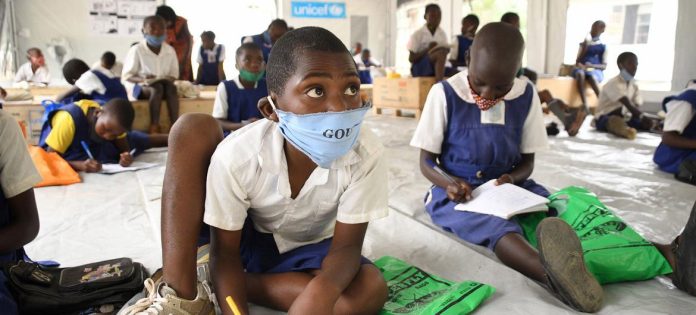As the COVID-19 pandemic enters its third year, 23 countries – home to around 405 million schoolchildren – are yet to fully open schools, with many schoolchildren at risk of dropping out, according to a new UNICEF report .
“When children are not able to interact with their teachers and their peers directly, their learning suffers,” said UNICEF Executive Director Catherine Russell. “When they are not able to interact with their teachers and peers at all, their learning loss may become permanent.
Sustainable Development Goal 4
In 2015, all United Nations Member States adopted a development policy on sustainability which centers around the 17 Sustainable Development Goals (SDG). The 17 goals provide a global blueprint for peace and prosperity of people and the planet and are set to be achieved by 2030.

Goal 4, labelled Quality Education, concerns inclusive and equitable quality education and promotion of lifelong learning opportunities for all. Goal 4 seeks to ensure all children have free primary and secondary education, that they have access to quality early childhood development, care and pre-primary education by 2030.
But what does the report from UNICEF say about the schooling situation?
Are children really learning?
Are children really learning? features country-level data on the impact of the COVID-19 pandemic and related school closures on children, as well as an updated analysis of the state of children’s learning before the pandemic. It points out that 147 million children missed more than half of their in-person schooling over the past 2 years. This amounts to 2 trillion hours of lost in-person learning globally.
In addition to data on learning loss, the report points to emerging evidence that shows many children did not return to school when their classrooms reopened, including in Liberia, West Africa, where 43 per cent of public-school students remained out of the classroom after schools reopened in December 2020.
Rising inequality
Out-of-school children are some of the most vulnerable and marginalized children in society. They are the least likely to be able to read, write or do basic math, and are cut off from the safety net that schools provide, which puts them at an increased risk of exploitation and a lifetime of poverty and deprivation.

“This rising inequality in access to learning, means that education risks becoming the greatest divider, not the greatest equalizer. When the world fails to educate its children, we all suffer.”
In the countries analyzed, the current pace of learning is so slow that it would take seven years for most schoolchildren to learn foundational reading skills that should have been grasped in two years, and 11 years to learn foundational numeracy skills.
Furthermore, there is no guarantee that schoolchildren have learned the basics at all, in many cases.
Covid-19 has slowed down the development of achieving Sustainable Development Goal 4, and it is especially children in Africa that are suffering from it. We need to act now to prevent the situation from getting even worse. UNICEF director states:
“We need a new normal: getting children into classrooms, assessing where they are in their learning, providing them with the intensive support they need to recover what they’ve missed, and ensuring that teachers have the training and learning resources they need. The stakes are too high to do anything less,” said Russell.
Read more here:
77 million children have spent 18 months out of class: #ReopenSchools, urges UNICEF | | UN News
Norway donates $10 million to education in South Sudan – United Nations Western Europe (unric.org)




